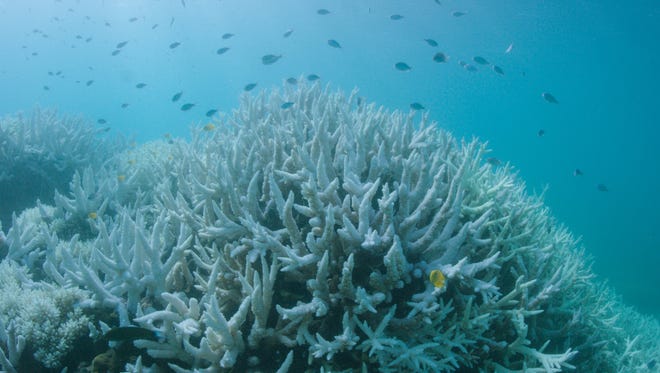Mass coral bleaching hits the Great Barrier Reef for the second year in a row

An expansive aerial survey found that the Great Barrier Reef has been ravaged by coral bleaching for the second year in a row, marking the first time the reef has not had several years to recover between bleaching events, according to researchers.
The Great Barrier Reef Marine Park Authority and researchers from the Australian Institute of Marine Science spent six hours flying over the reef between Townsville and Cairns, Australia. The survey found that bleaching is occurring in the central park of the park, which had escaped severe bleaching last year, according to a statement from the Marine Park Authority.
“How this event unfolds will depend very much on local weather conditions over the next few weeks,” Marine Park Authority Director of Reef Recovery Dr. David Wachenfeld said in a statement.

Warmer oceanic waters spurred by climate change, have led to an increase in coral bleaching around the world, according to the center.
The vibrant colors that draw thousands of tourists to the Great Barrier Reef each year come from algae that live in the coral's tissue. When water temperatures become too high, coral becomes stressed and expels the algae, which leave the coral a bleached white color. While some of the areas are expected to regain their normal color when temperatures drop, other parts of the reef have already experienced significant mortality of bleached coral.
The back-to-back summers of widespread coral bleaching likely mean that the water temperatures did not become low enough to allow the corral to adequately recovered, Neal Cantin from the Australian Institute of Marine Science said in a statement.
“We are seeing a decrease in the stress tolerance of these corals,” Cantin said. “This is the first time the Great Barrier Reef has not had a few years between bleaching events to recover.”
He said many coral species seem to be at greater threat of bleaching after more than a year of above-average ocean temperatures.
And while the bleaching is extremely alarming, Wachenfeld reiterated that not all bleached coral will die.
“As we saw last year bleaching and mortality can be highly variable across the 344,000 square kilometer Marine Park — an area bigger than Italy,” Wachenfeld said.
On social media, many used the hashtag #GreatBarrierReef to post photos of the reef and lament the latest bleaching.
Follow @MaryBowerman on Twitter: @MaryBowerman